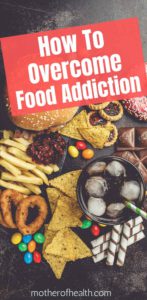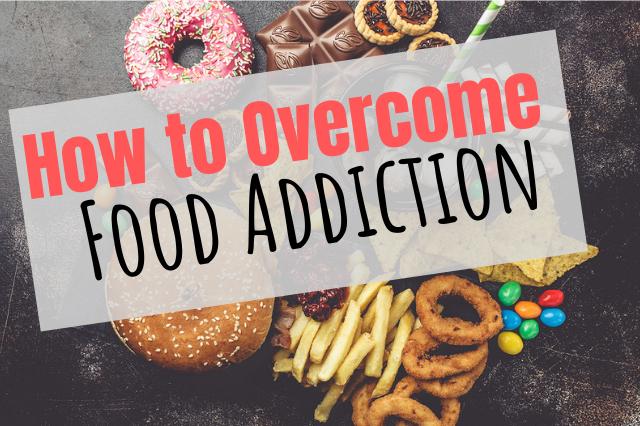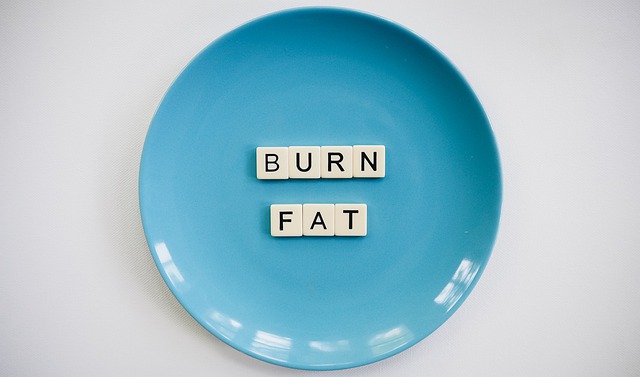Food addiction is real. If this is something you struggle with, you are not alone. Some people cannot restrain themselves around certain foods despite their best intentions. Around 5 percent of the population meets the criteria for food addiction.
Keep reading to learn how to overcome food addiction including why we are eating more than ever before, how certain foods affect your brain, steps, and tips to overcoming food addiction, plus 15 top fat-burning foods to concentrate on.
What is Food Addiction?
Food addiction is an unhealthy relationship with food, similar to drug addiction. It is related to several eating disorders like bulimia, and binge eating.
Are We Overeating More than Ever Before?
Sadly, processed foods with way too much sugar line the shelves of our markets. On top of that, our culture supports a sedentary lifestyle. People spend more time indoors curled up watching NetFlix eating popcorn, chocolate, or ice cream.
Processed, high-fat and sugary, foods make us hungrier. Especially the foods that are high in refined carbohydrates and artificial sweeteners.
When your blood sugar levels spike from eating these foods, it just leaves you feeling hungrier than ever. Not only that, but sugar activates the brain into thinking that you are not yet full. See how sugar can destroy your body!
How Certain Foods Affect Your Brain
Processed foods have an intense effect on the biochemistry of your brain.
For some people, there is an intense dopamine release that happens when they eat junk food.
Hyper-processed foods affect the brain in the same way that drugs like heroin and cocaine do. The same neurotransmitters involved in drug addiction are also present in food addiction.
So food addiction is not necessarily caused by a lack of willpower. Rather it results from dopamine signals that affect the biochemistry of your brain.
Powerless over certain foods
The first step is to admit that your food addiction has become unmanageable. It's the same first step as an alcoholic. You must admit you are powerless over some foods.
If there was something else you could do to have control over your eating, then you would not be powerless. This is obvious.
When you are in the grip of a long-standing destructive habit, you will have to deal with it in your way – the best way you can. Every person has to find their own natural rhythms and viable action to deal with food addiction. There is no one best way to deal with long-standing, destructive habits.
Help from a professional
If you decide to talk to a psychologist about your addiction, they will likely delve into why you have issues around food.
There are many eating disorders around food like binge eating, bulimia, anorexia, and food addiction. By focusing on your awareness, your behavioral choices, sensitivities and emotions, you'll be able to arrive at a way forward.
When you have ingrained habits of thinking, feeling and eating, your social and aesthetic choices are also affected. It will affect the type of clothes you choose and the relationships you choose as well.
A good psychologist would tell you the best place to start is where you have the most influence in your life – yourself!
You may discover the emotions and thoughts that you associate with eating and food. You can deal with the hurdles that get in the way of you improving your eating and exercise habits.
What is it that causes you to reach for food and drink as your comforting addiction?
Social or environmental pressures
Maybe you find that you are not a good socializer. Perhaps you feel uncomfortable among people and don’t know how to be socially adept around colleagues, friends, or family at social events, get-togethers, or meetings.
Like some people need a cigarette or a drink in their hand to get them through their feelings of social inadequacies. You might draw comfort in your food addiction.
Sometimes you might feel stress because you are in an environment where you have no choice but to eat and drink. Find ways to minimize the negative effects of all the social pressures and norms. It's perfectly okay to let family and friends know that you are cleaning up your diet. Ask them to support you.
You also need to discover what the environmental situations are that are stimulating your desire to want to overeat and not exercise.
Maybe you feel insecure, inadequate, even depressed. What causes you to despair and reach out for your comfort food? You vow to start a diet or to give up your food addiction tomorrow! Know the feeling?
When It's Time To Act
After you do some internal investigation and realize that you have a food addiction… That's the time to set goals to start tackling the problem head-on. For instance, you could make it a sincere goal that you will walk briskly for 30 minutes a day at least 3 times a week.
How to Overcome Food Addiction

Know the Difference Between Your Staples and Your Treats
Naturally, our brains are wired to look for delicious foods like berries and veggies from Nature, savoring healthy fats from avocados, olive oil, lean meats, and fish. These are the foods that have sustained us since the beginning of time.
But with all the fast, processed foods out there, it is so cheap and easy to go down that aisle. You need to be aware of the right and wrong foods to eat.
Recognizing and Becoming Aware of False, Fake Foods
The National Institutes of Health shows that brain scans of food addicts show the same damage and change as those of cocaine users. Research also shows that your regular table sugar (sucrose) is even more addictive than cocaine.
You need to start investigating and researching ways of detoxing your body and recovering from the false fixes of food and beverages causing you to lose control and to want to overeat.
Know Your Enemies
These Are Important in Your Detox and Recovery Process
Mind
Reclaim your brain. repair it with mindfulness and meditation, to stimulate new brain cell formation and to repair the damage. (More on meditation and weight loss here)
Mouth
Get high on whole organic foods that increase the dopamine production in your body naturally.
Specific foods are watermelon, spinach, tofu, avocados, and sesame seeds, to name a few. These can perform magic, re-establishing normal responses to natural foods.
For instance, eat plenty of fiber and protein such as carrots and hummus, peanut or almond butter, and apple slices. These foods will satisfy you and stop the urge to splurge on sugary, salty, and fatty foods.
Muscle
Every step you take in the day stimulates your brain growth. When your brain is healthy, you make better decisions around shedding weight. Research also shows that regular physical exercises keep you calmer, decreasing your chances of relapse. Walking is so easy and yet so effective. Doing it outdoors and stepping up the pace as often as you can; just getting moving, will do wonders.
Be Realistic
You need to be kind to yourself during this challenging process. You need to avoid focusing on slipping up and self-criticizing yourself. Rather, pick yourself and start again – setting yourself modest and manageable goals.
Be alert to people and patterns that are not helpful to you, stopping their influence. Acknowledge your progress with lovely rewards so that you are encouraged to move toward your new goals. Or celebrate with a friend (not with wrong eating though!) after a month of healthier eating.
Don’t be afraid to rely on others like your friends and family to help you because making changes can be pretty hard. When you have support and cheerleading along the way, it can motivate you to do even better.
Lastly, concentrate on other meaningful aspects of your life. You are all about so much more than your food addiction!
Food Addiction and Obesity Are Preventable
Food addiction to the wrong foods can have serious health complications.
Diseases such as heart disease, stroke, type 2 diabetes, and even cancer could make themselves known. The US national medical expenditures devoted to treating obesity-related illnesses rose from 6.13% in 2001 to 7.91% in 2015, a whopping increase of 29%.
There are a few reasons why people are overweight and obese, but one of the major reasons is just simply that people are eating more than ever before.
Here are six fantastic natural ways on how to overcome food addiction and end your love affair with junk food:

1. Eat More Nutrient-dense foods
- Sugary drinks
- Processed foods
- Refined carbohydrates
- Artificial sweeteners
All these are substances that contain no nutritional value. When you eat them, you soon find you are hungry again.
Now is the time to reach for foods that are nutrient-dense, packed with antioxidants, minerals, and vitamins.
- Berries
- Kale
- Grass-fed beef
- Salmon
- Tomatoes
- Sweet potatoes
- Mushrooms
- Beans
Once you start eating these foods, your body is going to start feeling good. You won’t be left feeling hungry again soon after. When you choose whole foods you help yourself to form a healthy relationship with food. You are starting to tune in to what your body really needs.
2. Include More Healthy Fats in Your Diet
The rule of fats in the past was that if you wanted to lose fat, you need to stay away from fat. But that’s not the case any longer.
We know now that a low-fat diet isn’t even effective, not even healthy. Fats satisfy and signal to your brain that you are full, thus reducing cravings and the urge to overeat. Natural healthy sources of fat are avocados, high-quality dairy, olive oil and coconut oil, seeds, and nuts.
3. Get rid of stress = getting rid of diseases
Chronic stress does affect your health, period. An excellent way to destress is to practice yoga, meditation, or going outside and getting attuned with nature. Of course, exercise plays a huge role. You won’t see all the excess pounds creeping up then.
Reducing stress levels is one of the top ways to lower the cortisol hormones in your body. Because when you have too much of this hormone in your body, caused by stress, you can end up with plenty of belly fat.
4. Take natural appetite suppressants
If you are an over-eater, wondering how to stop that forever-present hungry feeling, consider an appetite suppressant.
Not those shady types of ones that you find in rows at the drugstore. No, a natural one, like Gymnema Sylvestre
Gymnema Sylvestre:
- Reduces sugar cravings by making sweet foods taste like cardboard
- Helps to lower blood sugar
- May contribute to correct insulin levels by increasing insulin production
- Improves cholesterol and triglyceride levels, reducing heart disease
- May help with weight loss
- Helps reduce inflammation due to its tannin and saponin content
Also, include high fiber type foods like legumes, cayenne pepper, turmeric and grapefruit essential oils; that type of thing.
5. Eat mindfully
A good way to keep you from overeating, especially if it is out of boredom or just habit, is to practice mindful eating. Awareness is the key to change.
When you practice mindful eating, you are doing the exact opposite of emotional eating. Emotional eating is eating because you're upset or stressed or celebrating.
Mindful eating is being thoughtful of what you are eating. It is paying attention to when you are hungry and not when you think it time to eat something.
It is also taking into account what you truly feel like eating. For instance, be aware that because it is cold outside, something warm will be ideal. It’s also sitting down, preferably at a table, and not in front of the TV. You are actually preparing your food mindfully; aware of what is on your plate, eating it with full attention, away from distractions.
6. Intermittent fasting helps you overcome food addiction
If you are someone who is struggling not to eat in-between meals. Intermittent fasting but be exactly what you need.
I started intermittent fasting two years and am a huge fan because of the many benefits.
Intermittent fasting can regulate your hormones that signal when you feel hungry or when you have had enough. There are many options when it comes to intermittent fasting. Read up about Eat Stop Eat here and see if you would like to participate.

This 1-day cleanse formula will do three things for you:
- It will help you detox and quickly and easily lose weight
- It will leave you clear-headed and more productive
- It will reboot your health and eliminate rebound weight gain
With intermittent fasting, the pressure is off you to overeat to a certain extent because you don’t eat at all outside of your eating times. You will probably find you’re also practicing more mindful eating.
Apple Cider Vinegar
Reduces sugar cravings, detoxes the body, and balances the stomach’s PH balance.
Bone Broth
An ancient elixir: a healing food, burns fat, prevents muscle breakdown, detoxifies the body, increases metabolism.
Cayenne Pepper
Increases the body’s ability to burn fat, increasing energy. Increases metabolism, helping to lose fat faster.
Chia Seeds
A fat burner, increasing energy, helping to reduce hunger pangs and sugar cravings.
Chicken
Keeps the body energized with feelings of satiety. Eat only organic free range chicken.
Coconut Oil
Cruciferous Vegetables
Cauliflower, kale, and Brussel sprouts are all fat-burners, being so nutritionally dense.
Ghee
Another fat burner. Also appropriate for casein-sensitive people and lactose sensitive people.
Grapefruit
Grass-fed Beef
Skip the low-quality beef versions of grain fed beef which contain chemicals and hormones, etc. You don’t want to put these into your body. Invest in the highest sources of protein to encourage weight loss. Quality meat has lower fat, offering plenty of vitamins, good fats, and antioxidants.
Green Leafy Vegetables
Packed with nutrients and iron keeping muscles strong and functioning well to ward off osteoporosis.
Matcha Green Tea
Sipping on a cup of Matcha green tea can reduce body fat and also lower your cholesterol levels. It helps your body repair quicker after high-intensity workouts.
Kefir
Has medicinal benefits to fight infections. Full of probiotics associated with weight loss.
Rooibos Tea
Contains flavonoids and phytochemicals that help to lose weight and boost metabolism.
Whey Protein
Decreases body fat, increasing muscle tone. Spikes energy levels while stabilizing blood sugar.
Conclusion of How to Overcome Food Addiction
Scientists and health professionals know that food addiction can lead to obesity. But, normal-weight people can also struggle with food addiction.
The bottom line is this: food addiction is real and if you struggle with this please deal with it so you can be healthy. It's something you need to take seriously. You have the ability to reverse the damage and reclaim your healthy, natural relationship with food.





